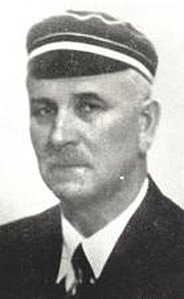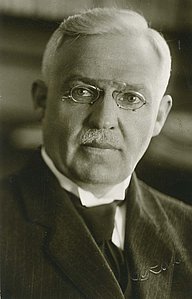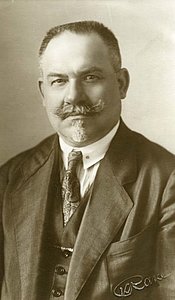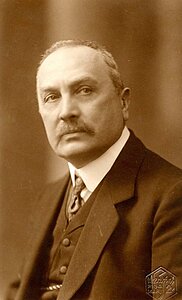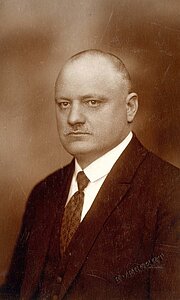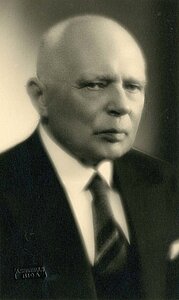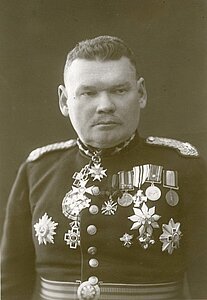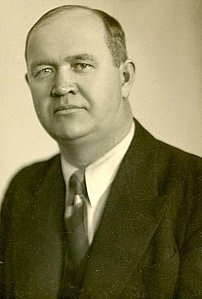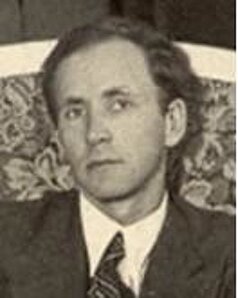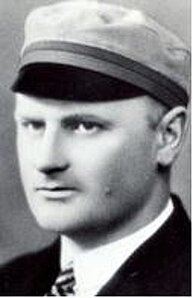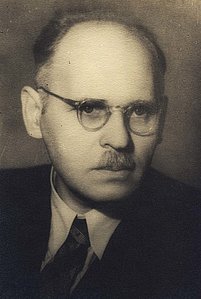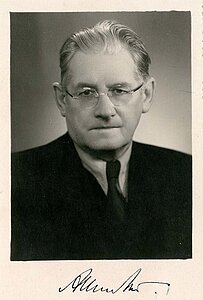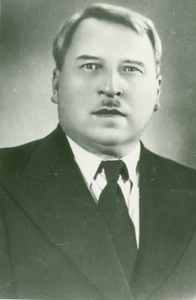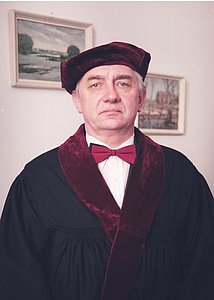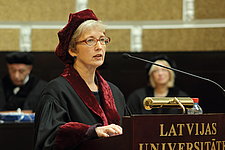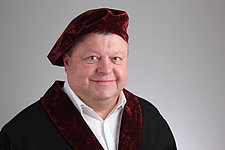Deans of the Faculty of Medicine from its establishment to the present day
The Dean is not only the highest official of the Faculty and the head of daily work, but also the one who determines the course of its development. The curriculum vitae of the deans of the Faculty of Medicine, which is closely related to the creation, growth, change and renewal of the FM, can be viewed electronically here.
Dean of the Faculty of Medicine from 1919 to 1920
Born in 1876 in Jaunrauna parish in "Kalna Šautuves" in a farmer's family. Studied at Jaunrauna Parish School and Kārlis Millers' Six-Year Boys' School. He then worked in pharmacies in Astrakhan and Saratov; In 1899 he obtained the degree of assistant pharmacist at the University of Kazan. In 1904 he graduated from the University of Tartu with a degree in pharmacy and was a member of the Lettgallia Corporation. After graduating from the university, he worked as a pharmacy manager at the A. Zebergs pharmacy in Dzerbene, then at the Staronikolsk pharmacy in Moscow, and later as a freelance assistant at the K. R. Frezenius Research Institute in Wiesbaden, specializing in nutrition and food chemistry. He worked as a pharmacist at the Sergievskaya Pharmacy in St. Petersburg and as a laboratory assistant at the Pharmaceutical Chemistry Laboratory of the St. Petersburg Military Medical Academy.
In 1908, in the St. Petersburg Military Medical Academy he developed a study "On galenic preparations made from different varieties of Balderian roots" and obtained a master's degree in pharmacy. From 1908 to 1918, he was the deputy director of the Laboratory of Bacteriology of the Russian Ministry of Agriculture and the head of the chemistry department. E. Zariņš was elected a private lecturer in the Department of Pharmacy and Pharmacognosy at the St. Petersburg Institute of Women's Medicine (1916), then an assistant professor at the Institute of Psychoneurology in Nutrition and Forensic Chemistry (1917) and a professor at Petrograd University II (1918).
He returned to Latvia in April 1919 and in August Minister of Education K. Kasparsons appointed him Professor and Dean of the University of Latvia. In 1920, he moved to the Faculty of Chemistry, where he served as Dean, lectured in nutrition and food chemistry, and headed the Laboratory of Food and Chemistry. In 1923 his Mag. pharm. degree was equated to a doctoral degree of the University of Latvia. From 1931 he was the chairman of the board of JSC "Farmācija", organized opium, morphine, codeine, codeine phosphate, urodan, hematogen, etc. manufacture of medicinal products. After the occupation of Latvia in 1940, he was dismissed from the position of dean of the Faculty of Chemistry and head of the department, but was reinstated during the German occupation.
In 1944 he went into exile in Germany, where he died in 1947 in Lahde, Germany.
Dean of the Faculty of Medicine from 1920 to 1923, from 1927 to 1929.
Born in 1874 in Kraķi, Iecava Parish, in a farmer's family. After school, he studied at the Alexander and Nikolai Gymnasium in Riga, as well as Moscow University, first graduating from the Faculty of Medicine in 1899 with a medical doctor's degree, and in 1904 from the Department of Natural Sciences of the Faculty of Physics and Mathematics with a degree in science. As a crown scholarship holder, he was left at the university to prepare for academic work, was repeatedly sent abroad to improve his knowledge, and in 1907 he defended his doctoral dissertation "On Nitrogen-Containing Muscle Extracts". In it he reported on his performance working under the leadership of professor Vladimir Gulevich, for the elucidation of carnitine isolated from meat extract in 1905 and its structural formula.
His research work continued at the University of Kharkov, where in 1909 he was elected head and professor of the Department of Physiological Chemistry.
He returned to Latvia in 1920 and became the first dean of the newly established UL FM, doing a lot in its establishment. From 1920 until the end of his life, the professor headed the Institute (Department) of Physiology and Physiological Chemistry, thus becoming the founder of two disciplines - physiology and biochemistry as a science and university subject in Latvia. He studied the physiological role of carnosine, carnitine and methylguanidine in the body, trained several young scientists and represented Latvia in the international scientific community.
In 1928, the professor was awarded the 3rd class of the Order of the Three Stars for his merits in science and the work of the university. He died in 1941 and was buried in Riga Forest Cemetery.
Dean of the Faculty of Medicine in 1923
Born in 1874 in the family of a miller in Bolderāja. After graduating from the Riga Alexander Gymnasium in 1894, he studied at the University of Tartu, obtained his medical degree in 1899, and for the next five years was an assistant at the University's Clinic of Eye Diseases, working under professors Eduards Rēlmanis and Fjodors Jeveckis; defended his doctoral dissertation on leprosy eye diseases in 1903.
He started working independently in 1904 as the director of the Zenyigorodka Eye Hospital in the Kiev province, from 1909 he was a school doctor in Kiev, from 1910 he was a private lecturer at the University of Kiev, from 1915 he was an assistant professor and from 1919 to 1922 director of the clinic.
He returned to Latvia with the reputation of a respectable scientist in 1922, when he was elected the head of the Eye Diseases Clinic of the University of Latvia. On April 23, 1923, he was elected Dean of FM, and on May 16, Rector of the University of Latvia. Until 1925 while he was serving as rector, the university significantly expanded, creating new departments, faculties and acquiring new properties. Contacts with foreign universities were established, scientific articles were published and the defense of doctoral dissertations was begun. He founded the Latvian Society of Ophthalmologists in 2006 and was its first chairman. He was elected honorary chairman of the Baltic Union of Ophthalmologists. He has studied the pathohistology of the eye, the etiology of flicktenulous eye diseases, tear ductus disease, the effects of adrenaline on intraocular pressure, cataract extraction, acable siderosis, and a history of ophthalmology. J.Ruberts established the Latvian school of ophthalmology.
Awarded Class III of the Order of the Three Stars in 1927, as well as four Russian Orders. Died in 1934 in Riga and was buried in the Great Cemetery. As the cemetery has not been preserved, a memorial stone has been created on the side of Senču Street.
Dean of the Faculty of Medicine from 1923 to 1925
Born in 1863 in Ungurpils in a charioteer's family. Studied at Valka Parish School, Valka County School and Tērbata Provincial Gymnasium. After graduating from the University of Tartu in 1888, pursuing further studies in Vienna and Berlin and defending his doctoral dissertation on colorectal cancer in 1889, he worked in Tartu, Yalta, Sevastopol and from 1898 in Odessa. There he became a lecturer at the University of New Russia (Novorossiysk), conducted research in experimental physiology at the laboratory of Bronislav Verigo, a professor born in Latgale, in 1918 he was elected head of the department and in 1920 a professor.
In 1922, when M. Zīle had reached the peak of his academic career, he accepted the invitation of the University of Latvia for professors of Latvian origin to return to their homeland and help build a new university. Until 1938, M. Zīle headed the FM Department of Therapy and Clinic, from 1923 to 1925 he was the Dean of FM and from 1927 to 1929 - the Rector of the University of Latvia. He was also the head of the Latvian Medical Association and the Latvian Tuberculosis Society, convening the 1st Latvian Congress of Doctors and Dentists in 1925 and the 1st International Medical Synthesis Conference in Riga in 1930 (the first international event of its kind in Latvia).
Awarded Class II and III of the Order of the Three Stars, elected Honorary Doctor of Uppsala University. Died in 1945 as a refugee in Unsleben, Germany.
Dean of the Faculty of Medicine from 1925 to 1927, from 1929 to 1931 and from 1935 to 1937
Born in 1882 in Jaunmigļi in Jaunpiebalga. After graduating from Riga City Gymnasium, he studied at the University of Tartu, where under prof. Vladimirs Čižs influence, he turned to psychiatry. V. Čižs studied the psychopathology of the works of the most prominent Russian writers; under his influence, H. Buduls published a book about the "twilight days" of his patient poet Jānis Poruks, which caused a stir in society. In 1911 H. Buduls obtained a doctor's diploma and in 1914 defended his doctoral dissertation on the epidemiology of mental illness in the Baltic population.
With the formation of the state of Latvia, in 1919 he became the director of Sarkankalns Hospital in Riga, achieved its rapid prosperity and remained in this position until the hospital closed in 1942; In 1938, due to the anniversary of the hospital, a large monograph dedicated to it was published. In 1920 he was elected an assistant professor and head of the Psychiatric Clinic of the newly established University of Latvia, in 1924 - a professor, several times the dean of MF. In 1924 and 1929, a two-part textbook on psychiatry was published, in which great attention was paid to the development of specialty terminology in the Latvian language. In the field of research, the professor was more interested in the issues of inheritance, epidemiology, clinical and laboratory diagnostics and treatment of mental illnesses. He has been awarded the 3rd class of the Order of the Three Stars for the merits of Latvia and its people.
At the end of World War II he emigrated. After arriving in Germany, he worked at the Wiesloch Psychiatric Hospital. He also died there in 1954 and his last wish was fulfilled - he was buried among his unfortunate patients in the hospital's cemetery. In 1993, a memorial plaque with a portrait was attached to the house in Riga, Blaumaņa Street 12a, where he lived.
Dean of the Faculty of Medicine from 1931 to 1933
Born in 1870 in Ķiviļi, Durbe parish, in the family of a carpenter. After graduating from Liepaja Nikolai Gymnasium in 1890, he studied in Tartu and in 1895 received a doctor's degree. He was a doctor of the Lazdona parish, enlisted in the Russian Army in 1897 and served in Poland, took part in the Russian-Japanese War, in 1907 defended his doctoral dissertation on ureteral surgery at the Military Medical Academy in St. Petersburg under Professor Sergei Fyodorov. He continued his service in Liepaja until 1910 and after his retirement, in 1912, he built his clinic at 28 Graudu Street. Returning to Liepaja in 1918, he was the head of the Sanitary Department of the Ministry of Defense of the Provisional Government of Latvia and the senior physician of the Lower Kurzeme War District until 1920 in the service of a colonel.
At the invitation of the newly established FM UL, he moved to Riga, was elected an assistant professor and in 1924 - a professor and head of the FM Surgery Clinic. From 1931 to 1933 he was the dean of FM, in 1930 and 1931 he was also the medical director of the Riga City Hospital (now P. Stradiņš Clinical University Hospital). The professor was the founder and editor of the Latvian Medical Journal from 1923 to 1939 and from 1942 to 1944, the head of the Latvian Medical Association from 1926 to 1930 and the head of the Latvian Medical Association from 1929 to 1932. He raised a strong new generation of Latvian surgeons. He has conducted research in operative urology, abdominal surgery, anesthesiology, field surgery and Latvian folk medicine, and has facilitated the entry of Latvian medicine into Europe.
He received well-deserved recognition from the Order of the Three Stars in 1927 and the Class II in 1935, several Russian orders, an honorary doctor of Kaunas University and an honorary member of the Finnish Medical Association as well as honorary member of the Latvian Medical Association, etc.
At the end of the Second World War he moved to Germany in 1944 and further to England in 1948. Died in London in 1957, his ashes were buried in the Riga Forest Cemetery in 1995.
Dean of the Faculty of Medicine from 1933 to 1935 and from 1937 to 1939.
Born in 1875 in Kazbuļi, Skulte parish, in a farmer's family. After graduating from Riga Nikolai Gymnasium in 1896, he went to St. Petersburg, where he obtained a doctor's degree from the Military Medical Academy in 1901. For three years he specialized in dermatovenerology in Timothy Pavlov's clinic and in 1904 defended his doctoral dissertation on the nature of papulonecrotic tuberculosis. He found that rubbing tuberculin into the patient's skin caused a local reaction, but it could not be properly assessed, and the worldwide fame of the discovery fell on him. He served in the Riga War Hospital, participated in the First World War, also in Latvian rifle units, and from 1916 to 1918 he taught a course in syphiliticology at the University of Tartu.
In 1919 P. Snikers participated in the founding of the University of Latvia and the Faculty of Medicine, in 1921 he was elected an assistant professor and in 1923 - a professor, headed the Department of Skin and Venereal Diseases and from 1933 to 1935. From 1937 to 1939 he was the UL FM dean. He published papers on diagnosis, treatment and prevention of venereal diseases.
From 1919 to 1933 he was the head of the Military Sanitary Administration of the Latvian Army, in 1923 he was awarded the rank of doctor-general . From 1932 to 1938 he was the head of the Latvian Medical Association, from 1921 to 1937, the head of the Latvian White Cross Society, and from 1934 to 1937, the chairman of the board of the Cancer Society. He was also a well-known patron, collecting an extensive collection of works of art.
Awarded the Order of the Three Stars in Class III in 1926 and Class II in 1928, the Cross of Merit of the Guards, the Cross of Honor of the Latvian Red Cross, five orders of the Russian Empire, as well as the Order of Lithuania, Poland and Estonia. He died in Riga in 1944 and was buried in the Forest Cemetery. In 1993, a memorial plaque to P. Snikers was unveiled at the house in Rīga, Brīvības Street 39 (which was built by his order and also belonged to him). In honor of its founder, the student corporation Fraternitas Metropolitana established the Peter Sniker Medal in 1996, with which it awards its most notable philistines.
Dean of the Faculty of Medicine from 1939 to 1940 and from 1941 to 1943
Born in 1892 in Sautiņi, Ādaži parish, in the family of a farmer. After graduating from the Riga Nikolai Gymnasium in 1911, he studied for two years in Tartu and then continued his studies at the Military Medical Academy in Petrograd. At the beginning of his career, he worked in Oryol and Ādaži, was drafted into the Red Army in 1919, and a few months later continued his service in the Latvian Army as a medical captain.
He started his academic career in 1920, led by prof. Gastons Bakmanis. In order to prepare properly for his future work, the university sent him as a fellow of the Rockefeller Foundation in 1925 and 1926 to the University of Michigan in the United States and to the Universities of Munich and Prague. Returning in 1926, Prīmanis defended his doctoral dissertation "Development and structure of the outer wall of Ductus cochlearis". In 1929 he was elected the head of the Institute of Anatomy (Department) and in 1932 - a professor.
He improved the facilities of the institute as well as the anatomy museum. He lectured in anatomy, histology and embryology, but from 1922 also in plastic anatomy for students of the Latvian Academy of Arts. From 1939 to 1940 and from 1941 to 1943, the professor was the dean of UL FM. Supporting his friend prof. Pauls Stradiņš, from 1938 to 1940, Prīmanis was the head of the Institute for the Study of the Popular Life Force of the Health Promotion Society, solving topical and important problems of demography and eugenics.
He conducted a number of studies in the human anatomy and also in Latvian anthropology, organizing extensive expeditions in the regions of Latvia. In 1931 he published the first "Latvian Anatomical Dictionary" (second edition in 1944), but in 1930 he received the Krišjānis Barons' Prize for his research "The Structure of the Latvian Body in Latvian Songs". Awarded Class III of the Order of the Three Stars in 1934 and Class III of the Cross of Recognition in 1939.
At the end of the war, he emigrated to Germany in 1944 and was a professor at the Baltic University from 1946 to 1948, and then a professor at the University of Pittsburgh in the United States until 1962. Died in 1971 in Pittsburgh.
Dean of the Faculty of Medicine from 1940 to 1941
Born in 1904 in Moscow in the family of a bussinesman. Studied at Winterthur Gymnasium in Switzerland. He studied philology, then medicine at the University of Latvia (1924-1930) and the Institute of Pharmacology of Uppsala University under prof. E. L. Bakmanis (1929). After graduating, he worked as a sub-assistant (1929-1936), assistant (1936-1940) at the Institute of Pharmacology of the University of Latvia under prof. Cēzars Amslers. In 1934 he defended his doctoral dissertation on the topic "Johimbin and the autonomic nervous system". In 1938 he joined the Lausanne Institute of Physiology, and in 1939-1940 he was a fellow of the Rockefeller Foundation.
After the occupation of Latvia on September 1, 1940, P. Vegers was appointed dean of UL FM, but on October 1, he was appointed assistant professor, head of the Department of Pharmacology, as well as director of the Institute of Experimental Medicine. During the German occupation, Vegers was removed from the position of dean on July 1, 1941, and appointed head of the Department of Physiology and Physiological Chemistry and acting head of the Department of Pharmacology.
At the end of World War II, he went to Germany as a refugee, worked at the University of Marburg as head of the Institute of Biochemistry until 1946, and later moved to the United States. In 1950, he became the first Latvian doctor in California to practice, until 1970 he practiced in Los Angeles and Santa Monica. He died September 7, 1991 in California.
Dean of the Faculty of Medicine from 1943 to 1944
Born in 1895 in Riga in the family of a merchant. Studied at the Nikolai Gymnasium in Tallinn, studied at the Petrograd Military Medical Academy (1915-1918). During the Latvian and Estonian struggle to freedom, he served in the Latvian and Estonian armies as a military doctor, and was the youngest doctor in the Liepāja garrison infirmary (1919-1922).
M. Veidemanis graduated from the University of Latvia (1922-1923), was a LU sub-assistant (1922-1924), junior assistant (1924-1928), assistant (1928-1930), senior assistant (1930-1937), assistant professor (1937-1941), extraordinary professor (1941-1943), professor (1943-1944). In 1929 he defended his doctoral dissertation on the prevalence of blood groups in the Latvian population.
He was a consultant at the Institute of Forensic Science (1925-1944), a doctor of the Riga City Court (1927-1940). In 1937 he became the head of the Institute of Forensic Medicine. M. Veidemanis served as dean of the UL FM from 1943 to 1944.
At the end of the Second World War from 1944 was in the Kurzeme Fortress, died in 1945 in Irlava.
Dean of the Faculty of Medicine from 1944 to 1946
Born in 1896 in the family of a carpenter in Eķengrāve, graduated with honors from Alexander Gymnasium in Riga and in 1919 from the Military Medical Academy in Petrograd, defended his doctoral dissertation in 1923 and returned to Latvia, where he started working at the University of Latvia and in 1927 in defended his second dissertation on spontaneous gangrene. The motto of his life was: "Aliis inserviendo consumor" (burned by giving light), "Medicine is at once a profession, science and art", "Only a good person can be a good doctor", "Love is the highest medicine" and "I must leave it to myself clinic, school of surgeons and museum ".
He has become a professor, head of the surgery clinic and department, chief physician of the largest hospital in Latvia, dean of UL FM, director of the research institute, founder of six associations, academician. In the historically changing age, Stradiņš did an enormous amount for the benefit of the sick person and his people, where medical treatment, science and pedagogy went hand in hand with organizational new work, continuous improvement of the health care of the population and improvement of its management.
He has worked in many industries and specialties, three of which are distinguished - surgery, oncology and history of medicine. Surgery was his main specialty, in oncology Stradins laid its clinical and organizational foundations in Latvia, focusing on early cancer diagnosis, but his hobby - the history of medicine - the Museum of Medical History - made Stradins' name far known in the world. At that time and up until today Stradiņš Museum is one of the three most significant medical museums in the world.
Working in constant overload, P. Stradiņš's life ended prematurely in 1958 in Riga, and he was buried in the Forest Cemetery. A museum, a hospital, a university and a medical college as well as four streets in Latvian cities have been named after him. Annual Stradiņš readings take place during which the Stradiņš Prize for achievements in medical science and history is presented. Monuments in his honour have been erected in Rīga and his native Viesīte.
Dean of the Faculty of Medicine from 1946 to 1949
Born in 1892 in Reņģe Parish, Tukums District, in the family of a miller. He graduated from Ventspils Real School in 1911 and studied at the V. Bechterev Institute of Psychoneurology in St. Petersburg, transferred to the Military Medical Academy in 1912, was drafted into the army in 1916 and received a diploma in 1922. At the same academy he prepared for scientific work and worked at the Department of Biochemistry until 1935, head of the Department of Biochemistry at the 2nd Leningrad Medical Institute (1927-1945) and scientific director and director of the All-Union Institute of Vitamins (1935-1945); defended his doctoral dissertation on the nature and significance of ascorbic acid in a living organism in 1939.
He arrived in Riga in 1945 and immediately held high positions: head of the Department of Biochemistry (1945-1950) and head of the Department of Organic Chemistry (1950-1951), Dean of UL FM (1946-1949); Academician Secretary of the Department of Biology and Agricultural Sciences of the Academy of Sciences of the Latvian SSR (1946-1952), director of the Institute of Nutrition (1946-1950), director of the Latvian Institute of Experimental and Clinical Medicine (1951-1953), head of the Metabolism and Nutrition Sector of this Institute (1952-1954) ), head of the Department of Biochemistry of the RMI (1950-1973), head of the Department of Biochemistry and Parenteral Nutrition of the Central Research Laboratory since 1972, deputy and deputy chairman of the Supreme Council of the LSSR (1947-1955), chairman of the Medical Scientific Council of the Ministry of Health of the LSSR since 1948 chairman of the Latvian branch of the All-Union Society of Biochemists since 1950.
Died in 1978 in Riga, buried in Rainis' Cemetery.
Dean of the Faculty of Medicine from 1949 to 1950
Born in 1898 in Limbaži to a worker's family. After getting into Petrograd during the First World War and passing the final exams of the gymnasium, he studied at the 1st Leningrad Medical Institute from 1920 to 1926, but after graduating he was a doctor in Leningrad, the Urals and Karelia. Returned to Leningrad, he was an assistant and deputy director of the Tuberculosis Institute (1935-1947), an assistant to the Military Medical Academy (1941-1947) and the head of a military hospital (also during the blockade). In 1943 he defended his dissertation on tuberculosis in Leningrad.
Invited by prof. P. Stradiņš, he arrived in Riga in 1947 and soon, working energetically, pushed aside his inviter, holding a couple of his important positions. From 1947 he was the head of the Department of Internal Medicine Diagnostics and Propaedeutics of the Latvian Academy of Sciences (and from 1950 - RMI), in 1948 he defended his doctoral dissertation elected professor. In 1949 and 1950 he was dean of UL FM.
In 1950, by order of the USSR Council of Ministers signed by Stalin, the Riga Medical Institute (now Riga Stradiņš University) was separated from the LVU Faculty of Medicine according to the Soviet model. One of the main initiators and doers is E. Burtnieks, who became the first director of RMI. Along with the position of chief physician of the Republican Clinical Hospital (1947-1951).
E. Burtnieks' research is devoted to the treatment of pulmonary tuberculosis using paraaminosalicylic acid, pneumotoxic serum, low blood transfusion, variable diet and artificial pneumothorax. Elected corresponding member of the USSR Academy of Medical Sciences (1955). Awarded two USSR orders and several medals, the title of meritorious researcher of the LSSR (1949).
Died in a traffic accident in Riga in 1958, buried in the Seraphim Cemetery in Leningrad.
Dean of the Faculty of Medicine from 1998 to 2008
Born in 1943 in Riga. Studied at Riga Secondary School No. 5, studied at the Faculty of Medicine of the Riga Medical Institute, obtaining a doctor's degree in 1968. After graduating, he worked as a surgeon-oncologist in Saldus. In 1971, he was admitted to the Institute of Experimental and Clinical Oncology in Moscow, where he graduated in 1975 with the dissertation "Treatment of Primary Breast Cancer". After returning to Latvia, he started working at the Latvian Institute of Experimental and Clinical Medicine as a junior researcher, but was soon invited to work at the Department of Oncology of RMI. In 1982 he was elected an assistant professor, in 1984 he became the vice-rector for studies at RMI. In 1993, he became the head of the Department of Oncology of the Latvian Academy of Medicine and the chairman of its Senate.
In 1997 he defended his doctoral dissertation on the epidemiology, treatment and prognosis of breast cancer at the Latvian Institute of Experimental and Clinical Medicine. In 1998, he led an initiative group for the renewal of the FM of the University of Latvia, was appointed Acting Dean of the FM and elected a professor. He has served for two consecutive terms as Dean of the University of Latvia (1998-2008).
In 1999 he was elected a corresponding member of the Latvian Academy of Sciences. From 1998 to 2001 U. Vikmanis was the president of the Latvian Association of Oncologists. He was a member of the editorial board of the medical journals “Latvijas Ārstu Žurnāls" (Latvian Medical Journal), “Acta Oncologica”, “Ģimenes Ārsts" (Family Doctor). From 2008 to 2016, he served as the vice-dean of FM.
Dean of the Faculty of Medicine from 2008 to 2016
Born in 1959 in Daugavpils. Studied at Daugavpils Secondary School No. 1, studied at the Medical Faculty of the Riga Medical Institute, obtaining a doctor's degree in 1983. After graduating, she worked at the RMI Faculty of Pediatrics as a clinical ordinator (1983-1985). She studied postgraduate studies at the Moscow Institute of Rheumatology (1985-1988), in 1990 defended her dissertation "Clinical genetic study of juvenile rheumatoid arthritis". In 1992, she was elected an assistant professor at the Department of Pediatrics at RMI, and in 1996 she defended her doctoral dissertation on the epidemiology, immunogenetics and prognosis of juvenile chronic arthritis. She was the Head of the Department of Pediatrics of the Latvian Academy of Medicine (1993-1998), Dean of the Faculty of Pediatrics (1990-1993), Vice-Dean of the Faculty of Medicine (1993-1997).
Participated in the initiative group for the renewal of the FM of the University of Latvia, in 1998 the University of Latvia was elected professor of pediatrics, in 1999 as the vice-dean of the faculty. She has been a correspondent member of the Latvian Academy of Sciences since 2006. I. Rumba-Rozenfelde served as dean of the UL FM were held for two consecutive terms (2008-2016).
Dean of the Faculty of Medicine since 2016
Born in 1961 in Riga. He obtained his doctor's degree from the Riga Medical Institute (1985) and later graduated from the Faculty of Pedagogy and Psychology of the University of Latvia, obtaining a Mg. paed. degree (1995) and from the German Academy for Developmental Rehabilitation (1996). At UL he defended his doctoral dissertation on the method of objective audiometry in the detection and developmental rehabilitation of children's hearing disorders (1999).
V. Folkmanis was an internist at the Latvian Pool Hospital (1986–1988), a clinical ordinator and associate at the Department of Neurology and Neurosurgery at Latvian Academy of Medicine (1988–1992), neurologist at the Latvian Children's Hearing Center (1992–1998), Deputy Head of the Health Care Policy Division of the Ministry of Welfare (1998–1999 ), Director of the UL FM Social Pediatrics Center (1999–2016), Assistant Professor at the UL Faculty of Pedagogy and Psychology (2001-2012), Associate Professor at the UL Faculty of Medicine (2012–2016) and a Professor since 2016. V. Folkmanis also heads the final examination commission for the professional bachelor study program "Audiologopaedics" at the Faculty of Rehabilitation of Riga Stradņš University.
V. Folkmanis teaches study courses in neurology and social medicine. His dedicates his research work to child development issues and hearing impairment. He is the Dean of the UL FM since 2016.

 Academic Centre
Academic Centre